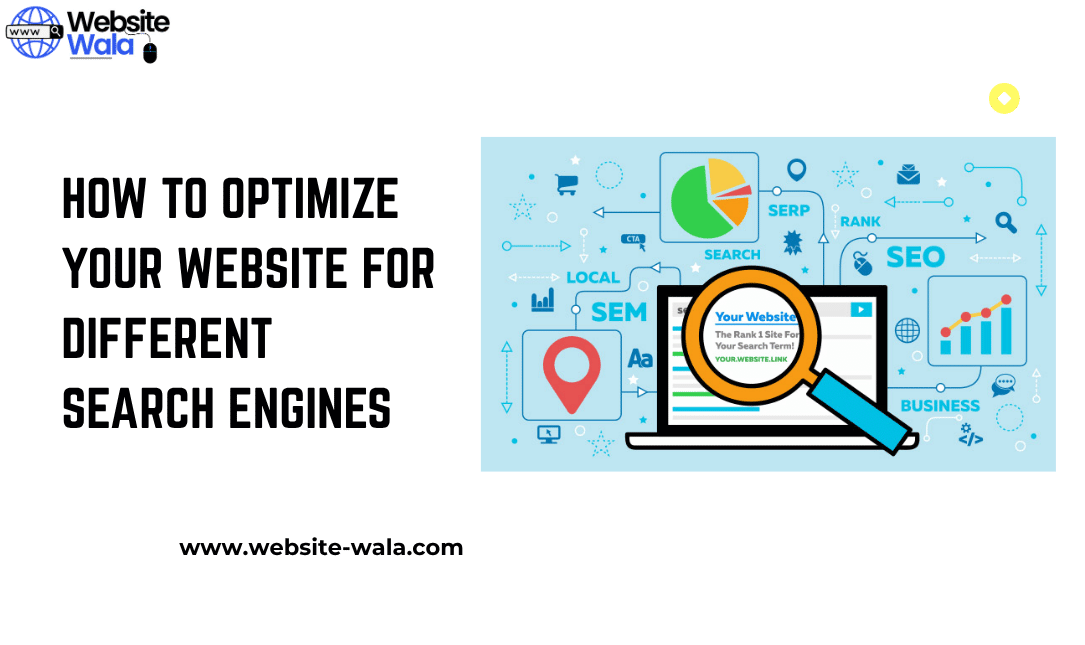
Learn How to Optimize Your Website for Different Search Engines using effective SEO techniques to improve website visibility and increase search engine ranking.
How to Optimize Your Website for Different Search Engines
In the ever-evolving digital landscape, businesses and website owners constantly seek ways to increase their online visibility. Understanding how to optimize your website for different search engines is essential for reaching a broader audience and boosting traffic. While Google remains the dominant search engine, platforms like Bing and Yahoo still hold significant user bases. Effective website optimization requires a tailored approach for each search engine to ensure your content ranks highly and attracts the right audience.
Understanding the Importance of Search Engine Optimization
Search engine optimization (SEO) is the practice of enhancing a website to improve its visibility on search engines. By understanding how to optimize your website for different search engines, you can implement SEO best practices that cater to specific search algorithms. High search engine ranking leads to increased website traffic, higher conversion rates, and a stronger online presence.
Key search engine ranking factors include website speed, mobile-friendliness, quality content, backlinks, and meta elements. Leveraging these factors effectively is crucial for Google search optimization, Bing search optimization, and Yahoo search optimization.
Tailoring Website Optimization for Google
Google dominates the global search market, making Google search optimization a priority for many website owners. To optimize your site for Google:
-
Focus on High-Quality Content: Google values content that answers users’ questions effectively. Incorporate relevant keywords naturally, including your primary keyword: How to Optimize Your Website for Different Search Engines.
-
Optimize Website Meta Tags: Ensure your meta titles, descriptions, and headers are compelling and include target keywords.
-
Improve Website Speed: A fast-loading website enhances user experience and boosts rankings.
-
Mobile Optimization: Google prioritizes mobile-friendly websites in its search results.
-
Backlinks: Secure high-quality backlinks to improve domain authority.
Implementing these website SEO strategies will significantly enhance your Google search ranking and drive more organic traffic.
Bing Search Optimization Techniques
Although Google dominates, Bing powers a notable portion of web searches. Bing search optimization often requires slightly different strategies:
-
Keyword Usage: Bing places more emphasis on exact-match keywords. Naturally include phrases like How to Optimize Your Website for Different Search Engines in headings and content.
-
Social Signals: Bing considers social media engagement as a ranking factor.
-
Multimedia Content: Incorporating images, videos, and infographics can improve visibility on Bing.
-
Website Optimization Tips: Ensure your site is accessible and free from technical errors to help Bing crawl your pages effectively.
Applying these techniques ensures your site performs well on Bing, complementing your overall SEO strategy.
Optimizing for Yahoo
Yahoo’s search engine still attracts millions of users. Although powered by Bing’s algorithm, Yahoo search optimization has unique considerations:
-
Consistent Metadata: Maintain consistent website meta tags and descriptions across all pages.
-
Local SEO: Yahoo favors local search results, so optimizing for local listings is beneficial.
-
Keyword Integration: Use relevant keywords naturally within your content to increase search engine ranking.
By addressing these factors, you can extend your website’s reach to Yahoo users without duplicating efforts from Bing optimization.
Universal Website SEO Strategies
Beyond platform-specific approaches, there are general website SEO strategies applicable to all search engines:
-
Conduct Keyword Research: Identify high-performing keywords relevant to your niche.
-
Use SEO Techniques Effectively: Optimize headings, meta descriptions, image alt text, and internal links.
-
Focus on User Experience (UX): Ensure intuitive navigation, fast load times, and mobile compatibility.
-
Regularly Update Content: Fresh and relevant content signals authority and helps improve website visibility.
-
Monitor Analytics: Track website traffic, click-through rates, and keyword performance to refine strategies.
Following these website optimization tips ensures long-term growth in search engine ranking across all platforms.
Importance of Meta Tags in SEO
Website meta tags play a vital role in telling search engines about your content. Effective meta tags include:
-
Title Tags: Incorporate primary and secondary keywords naturally.
-
Meta Descriptions: Create compelling descriptions that improve click-through rates.
-
Header Tags (H1, H2, H3): Organize content for better readability and search engine understanding.
Correct implementation of meta tags contributes to increase search engine ranking and helps your content reach the target audience effectively.
Advanced SEO Techniques for Enhanced Visibility
To fully leverage SEO, consider implementing advanced SEO techniques:
-
Schema Markup: Helps search engines understand your content and improves rich snippet visibility.
-
Internal Linking: Strengthens website architecture and distributes page authority.
-
Voice Search Optimization: Tailor content for natural language queries to capture voice search traffic.
-
Image Optimization: Compress images, use descriptive filenames, and include alt text.
These advanced strategies ensure your website not only ranks well but also improves website visibility across different search engines.
Measuring Success and Adjusting Strategy
After applying website optimization strategies, continuous monitoring is essential:
-
Use tools like Google Analytics, Bing Webmaster Tools, and Yahoo Search Analytics.
-
Track search engine ranking factors to identify areas for improvement.
-
Adjust content, metadata, and technical elements based on performance metrics.
Monitoring and refining your approach ensures sustainable growth and maximizes the benefits of knowing how to optimize your website for different search engines.
Conclusion
Understanding how to optimize your website for different search engines is crucial for achieving a strong online presence. By implementing tailored strategies for Google, Bing, and Yahoo, while also adhering to general website SEO strategies and SEO best practices, you can increase search engine ranking and improve website visibility. Focused efforts on website meta tags, content quality, user experience, and technical optimization collectively ensure your website performs optimally across all major search engines.
Optimizing for multiple platforms may seem complex, but consistent application of these website optimization tips and SEO techniques will yield long-term benefits, attracting more traffic, enhancing credibility, and boosting business growth.























